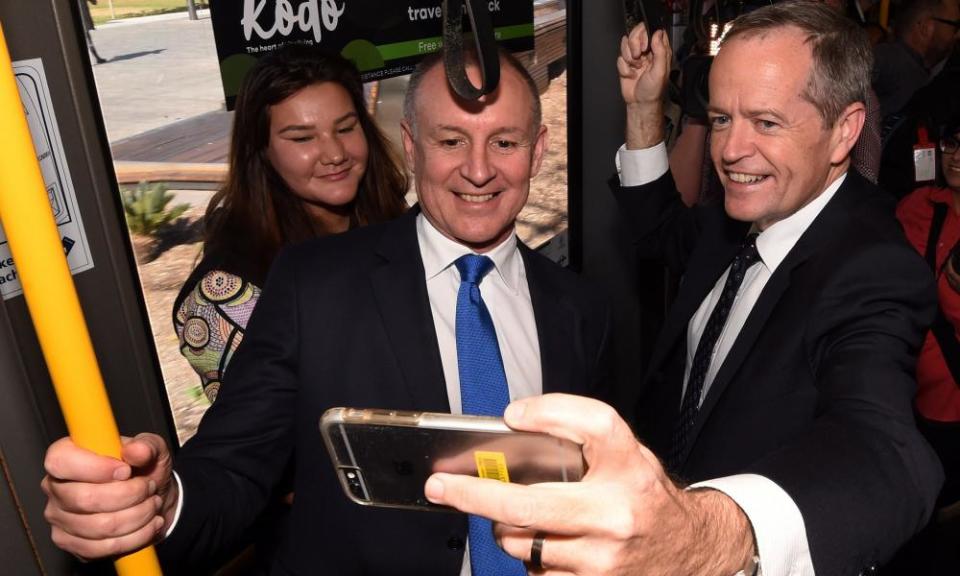Labor states won't solve PM's ‘political problems’ on energy, Weatherill says

The South Australian premier says Labor states will not accept a national energy policy that cuts renewable energy targets, removes incentives for low-emissions technologies and promotes coal.
In an interview with Guardian Australia, Jay Weatherill said the Labor states had no interest in “solving Malcolm Turnbull’s political problems” – and said the expectation of the premiers was that Bill Shorten would hold firm in opposing the national energy guarantee outlined by the prime minister on Tuesday.
Weatherill said he had spoken with all the Labor premiers over the past few days and with his federal Labor colleagues. The Labor opposition in Canberra is maintaining an open mind on the new energy policy.
Weatherill said his advice to Shorten had been “just maintain the present position, which is opposition to watering down renewable energy targets, watering down of incentives for renewable projects and reject the promotion of coal over the technologies of the future”.
Weatherill said he was confident “Labor’s position will remain as it is” and he issued a warning “the political history is littered with Labor leaders who have backed down on renewable energy”.
“Bill has always had a very strong position on this and I’m sure he’ll maintain it,” he said.
The national energy guarantee unveiled by the Turnbull government this week imposes new reliability and emissions reduction obligations on energy retailers after 2020. The policy model relies on cooperation with state governments.
The Energy Security Board’s proposal, adopted by the government, says the new reliability and emissions reduction obligations to be imposed on electricity retailers after 2020 should be implemented through the Council of Australian Governments’ energy council.
“Under this option existing national energy market arrangements including the Australian energy market agreement would be amended to introduce a new law, implemented by South Australia and applied in each of the other jurisdictions, similar to the national electricity law,” the advice from the ESB says.
Weatherill said that if Turnbull was serious about getting an outcome, he would have included the states in the process, as they were included in the Finkel review of the national electricity market earlier this year.
The premier said any prime minister serious about getting an outcome would have presented state leaders with a detailed plan and all the modelling associated with it “rather than boxing them into a corner with some sort of fait accompli”.
He said Turnbull had lined up energy regulators who were supposed to work with state governments for a “media stunt, and they all rattle off earnestly how important it is that we have to reach agreement – and he doesn’t speak to the people who he actually expects to legislate it”.
“That’s a novel way of approaching an issue.”
Weatherill declared Turnbull was “manifestly holding a losing hand”.
“The community wants a strong renewable energy target,” the premier said. “The community wants incentives for renewable energy. The community wants the technologies of the future, not a return to coal.
“He’s holding all the wrong hand and he wants the Labor states to get him off the hook.
“Well, we are not going to cooperate in a scheme that doesn’t continue all those objectives: solid renewable energy targets, incentives for renewable energy and a move away from the technologies of the past.”
Federally, some Labor figures are attracted to the national energy guarantee model, believing it to be a regulated carbon price, but the ALP is unlikely to race to a decision.
Labor federally will also be influenced by the attitudes of premiers, cognisant of the fact a number of the incumbents, including Weatherill, are facing elections in their states.
Shorten told reporters in Canberra on Thursday that Labor was looking at the government proposal but “we are deeply concerned and fearful that Turnbull is giving away the Australian renewable energy industry in return for a possible 50c a week reduction in power bills”.
“This is a plan with no detail, it is a headline with no story,” Shorten said. “They have sort of declared mission accomplished but they have no detailed modelling.”
At a breakfast briefing for business leaders, Turnbull said the government was looking to the opposition to get behind the plan and achieve peace in the climate wars.
Asked what he would do if the premiers refused to cooperate with his plan, Turnbull said: “Let’s focus on getting them to say yes.”
Weatherill acknowledged that a level of fatigue had crept into the energy debate. “Everybody is gasping for breath now and saying can we stop fighting and can we just end the uncertainty?
“That’s code for we are all fatigued because Tony Abbott has brought us to a standstill and we now have to surrender to him.”
But Weatherill said he had no intention of “hauling up the white flag” for Abbott and he said key players in the energy sector would also express concerns about the plan as the dust began to settle.
He said while there was a great desire for certainty, the national energy guarantee was a “false certainty” because it would not allow Australia to meet its Paris targets.
Weatherill said if the national energy guarantee settled nothing, the investment climate would remain uncertain.

 Yahoo News
Yahoo News 